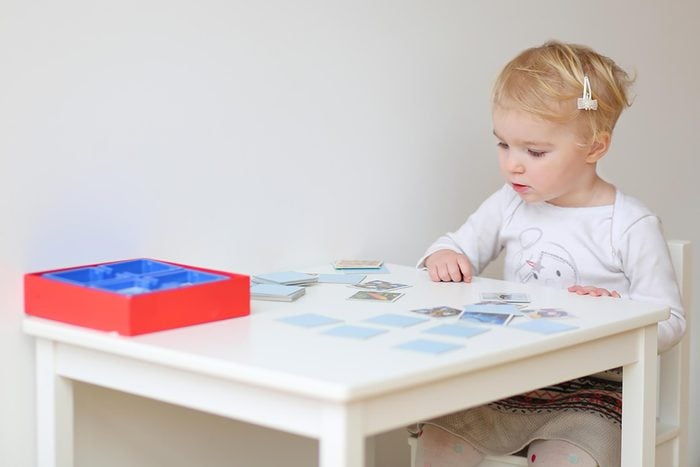
Every child is special
All parents want to believe their children are special and unique, and they are! But some children are destined to be the next great thinkers. How can you tell if your little one is more than just smart and in the leagues of Einstein, Mozart, or Marie Curie? The National Association for Gifted Children estimates that 3 million children in America are gifted. (They define “gifted” as “those who demonstrate outstanding levels of aptitude or competence in one or more domains.”) Assessing whether a child meets this criterion is far more complicated than simply relying on test scores. In fact, many educators look for other signs of exceptional intelligence that cannot be measured by a test or exam to figure out if they have genius kids on their hands. Be on the lookout for the following signs that you might have a future Mensa member on your hands.

Racing through milestones
One of the first signs that you may be raising a genius appears very early on in a child’s life. Achieving developmental milestones way before predicted can be a sign that your child is ready to be challenged. Eboni Hollier, MD, board-certified in developmental and behavioral pediatrics says, “Many parents of gifted children note that they often master developmental milestones at an earlier age than expected. In particular, language skills may be significantly above age level. Many gifted children often develop an extensive vocabulary and speak in complex sentences at an early age,” she says.

They love to read
Just like author Roald Dahl’s famous child-genius heroine, Matilda, child prodigies tend to be voracious readers. Genius kids often learn to read quickly and earlier than other children the same age and enjoy reading for meaning and pleasure. If your child has worked their way through Matilda’s reading list, they may well be genius material! These are the 10 simple ways to get your kid to love reading.

Curiosity about the world
Smart kids are interested in the world around them, but real geniuses have an insatiable curiosity to find out about the very minutia of how things work. From inquiring about every single mammal’s individual eating habits to insisting on knowing exactly how the toaster works, gifted children might test their parents’ patience with an unending stream of questions.

Early pattern recognition
Genius kids will begin to recognize repetition at an early age but it’s not just simple color or shape patterns that catch their eye. Niranjan Reddy, PhD, from SuperBaby, suggests that gifted children not only notice patterns and shapes in games and activities but can also see repeated behaviors, activities, and actions more easily than their peers. “Gifted children notice everything, from which bus passes the house after breakfast time to how many bricks can fit inside the toy trunk. They are very good at observing and remembering key information,” he says. Make sure you avoid these 8 compliments that actually hurt your kid.

A detailed knowledge or interest in their favorite topic
Genius kids will often have in-depth knowledge in one particular subject specialism or area of interest. This might mean they can tell you the scientific name of every dinosaur or explain the internal workings of a car engine. Whatever the topic a child prodigy’s knowledge is usually all-encompassing. As Science Daily explains, “A prodigy is someone who, by the age of roughly 11, displays expert proficiency or a profound grasp of the fundamentals in a field usually only undertaken by adults.”

Preferring the company of adults or older peers
Gifted children may find it difficult to relate to their peers who may have different interests and abilities. Very smart kids can often feel bored in class as the work is too easy for them and will seek out more stimulating conversation with older peers and adults. You can help your child to make friends with people of all ages by teaching them social skills and empathy. These are the 8 signs you’re raising an emotionally intelligent child.

Focus and determination
Gifted children have perseverance for sticking with a task or habit until they have mastered it. Sunny Verma, founder and CEO of Tutorbright says, “Gifted children typically have an amazing sense of focus. When given a task, they tend to work on it without distractions until completion. TV, video games, and social media do not divert their attention, allowing them to finish with efficiency.” Here’s a list of fun and exciting girl games that are not limited to clothes and makeup.

Leadership skills
Because of their maturity and natural organizational abilities many genius kids will become leaders of the industry. Verma says that gifted children “typically can take charge to find the most effective solution. They also self-regulate their performance, making them always look for ways to improve—a desirable trait of leaders regardless of age. Because of this ability, they usually can lead their peers, as they have more confidence in their sense of direction and experience in taking charge.” Check out these things your child’s teacher wants you to know.

They are original
A common marker for recognizing a child may be exceptional is that they not only understand advanced work by others but they are also able to offer their own unique and original thoughts and insight into problems and puzzles. An article in Creativity Post finds that geniuses are always looking for new ways to approach problems or to look at the world, “They ask ‘How many different ways can I look at it?, ‘How can I rethink the way I see it?’, and ‘How many different ways can I solve it?'”

They’re not perfect
It’s worth remembering that even gifted children will still make mistakes, get things wrong, not behave correctly, or have setbacks from time to time. After all, they’re still kids! Being exceptional doesn’t always mean you are exceptional across all curriculum subjects or aptitudes. Your child may be a math prodigy but find music baffling, or they may excel in a range of sports but find reading challenging. The key is to provide balanced opportunities for them to learn and develop. Mallory Kojkowski, EdD, director of admissions and outreach at Fusion Academy in Miami, reminds parents that even genius kids have areas of weakness. “Gifted students benefit from advanced cognitive competencies, but may still struggle in areas related to frustration, carelessness, lack of executive functioning skills, or poor concentration skills,” she says.

There is a place for tests
Although testing is only part of the assessment procedure for understanding if your child may be gifted, it can be an important marker, especially for school placements. Another test available from ORIG3N, a leader in regenerative medicine technology and consumer genetics assessments, may be able to tell you if your child has exceptional aptitude in a range of subject areas. The BLOOM DNA kit can assess the genes that impact childhood development in the following areas: aptitude for learning new languages, math ability, memory recall, and other cognitive abilities. Whether or not your child is technically “gifted,” they are no doubt a gift to you and their potential is unlimited. Don’t miss these 10 habits of parents who raise successful kids.